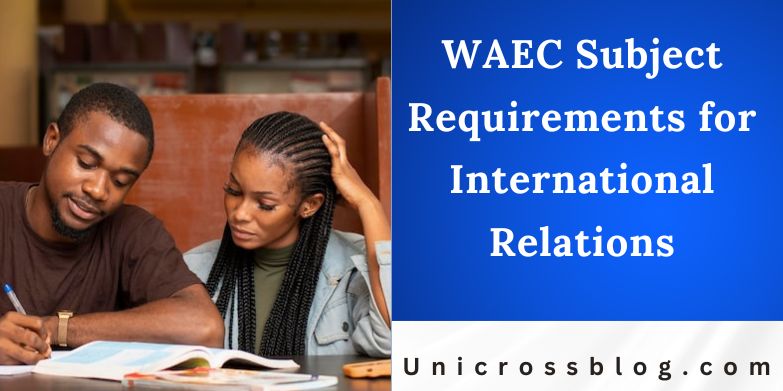International Relations (IR) is a captivating field that delves into the interactions between nations, organizations, and global actors. It encompasses diplomacy, international law, conflict resolution, global economics, and cultural exchanges. In Nigeria, studying IR equips students with skills to navigate complex world affairs, preparing them for careers in foreign service, international NGOs, policy analysis, and multinational corporations. The discipline fosters critical thinking, cultural awareness, and strategic decision-making, making it ideal for those passionate about global issues.
To pursue a bachelor’s degree in International Relations at a Nigerian university, candidates must meet specific entry requirements set by the Joint Admissions and Matriculation Board (JAMB) and individual institutions. A key component is the West African Examinations Council (WAEC) Senior School Certificate Examination, which serves as the O’Level qualification. WAEC results are crucial because they demonstrate foundational knowledge in relevant subjects. Typically, universities require at least five credit passes (grades A1 to C6) in WAEC (or equivalent like NECO or GCE) obtained in no more than two sittings. These credits must include core subjects that align with the social sciences and humanities nature of IR.
The WAEC subject requirements emphasize English proficiency, political awareness, economic understanding, and analytical skills. While the core combination is consistent across most universities, slight variations exist based on institutional preferences. For instance, some emphasize History over Economics, while others prioritize Geography for its global perspective. Meeting these requirements not only fulfills admission criteria but also builds a strong base for university-level studies in IR, where you’ll explore topics like international security, trade agreements, and human rights.
Understanding these requirements early helps secondary school students select the right subjects during WAEC registration. It also prevents common pitfalls, such as choosing irrelevant subjects that could disqualify you from admission. In the sections below, we outline the compulsory subjects, recommended combinations, university variations, and preparation tips. By aligning your WAEC choices with IR demands, you position yourself for success in JAMB UTME and post-UTME screenings, ultimately opening doors to a rewarding career in global affairs.

Compulsory WAEC Subjects for International Relations
The foundation of WAEC requirements for IR is built on five essential credits. These subjects are non-negotiable for most Nigerian universities offering the course. They ensure you have the basic literacy, numeracy, and subject-specific knowledge needed for the program.
- English Language: This is mandatory for all courses in Nigeria. A credit pass (C6 or better) is required because English is the official language of instruction and essential for diplomatic communication in IR.
- Mathematics: Often overlooked in arts-focused courses, a credit in Mathematics is required by many universities to support quantitative analysis in economic and statistical aspects of international studies.
- Government: This subject is central to IR, covering political systems, governance, and public administration. It helps you understand national and international politics, making it a core requirement.
- Economics: Essential for grasping global trade, development economics, and financial diplomacy. A credit here prepares you for modules on international monetary policies and economic relations.
- One Additional Arts or Social Science Subject: This can be History, Geography, Civic Education, Literature-in-English, or Commerce. It provides flexibility while reinforcing skills in historical context, spatial awareness, or ethical reasoning relevant to IR.
These five subjects must be passed at credit level in one or two sittings. Failure in any, especially English or Mathematics, can bar you from admission entirely. Universities like the University of Lagos (UNILAG) and Obafemi Awolowo University (OAU) strictly enforce this combination to ensure candidates are well-prepared for the rigors of IR coursework.
Recommended Full WAEC Subject Combination
While the minimum is five credits, WAEC candidates typically register for eight or nine subjects to broaden their options and strengthen their profile. For IR aspirants, the ideal combination balances compulsory subjects with electives that enhance your understanding of global dynamics. Here’s a recommended nine-subject lineup:
- English Language (compulsory)
- Mathematics (compulsory)
- Government (compulsory)
- Economics (compulsory)
- Civic Education (builds ethical and citizenship knowledge, useful for international human rights studies)
- History (provides historical insights into wars, treaties, and decolonization)
- Geography (covers physical and human geography, aiding in geopolitical analysis)
- Literature-in-English (develops analytical writing and comprehension for diplomatic reports)
- One elective, such as Commerce, French, or Christian Religious Studies (CRS), depending on your interests
This combination totals nine subjects, which is the standard for WAEC registration. It allows you to meet IR requirements while qualifying for related fields like Political Science or Diplomacy if needed. Prioritize scoring high in the core five, as they carry the most weight in admission screening.
Preparation Tips for WAEC Subjects
Preparing for WAEC in these subjects requires a strategic approach. Start by familiarizing yourself with the syllabus on the WAEC website, focusing on past questions from the last five years. Allocate study time evenly: dedicate 40% to core subjects like Government and Economics, 30% to English and Mathematics, and 30% to electives.
Join study groups or use revision apps for interactive learning. Practice essay writing for English and Government, as IR demands articulate expression. For Mathematics, solve quantitative problems related to economics scenarios. Time management during exams is key; aim to finish objective sections first.
If you’re resitting WAEC, combine results with NECO for up to two sittings. Health and consistency matter: study 4-6 hours daily, take breaks, and seek teacher guidance for weak areas. High scores (A1-B3) in these subjects boost your JAMB UTME chances and post-screening merit lists.
Career Prospects in International Relations
A degree in IR opens diverse opportunities. Graduates can become diplomats in the Nigerian Foreign Service, policy advisors in think tanks, or analysts in international organizations like the UN or AU. Other paths include corporate roles in global firms, journalism on foreign affairs, or NGOs focused on development and peacebuilding. Entry-level salaries range from N150,000 to N300,000 monthly, rising with experience and certifications like those from the Chartered Institute of Diplomacy.
The field is dynamic, with growing demand due to globalization and regional integrations like ECOWAS. Skills from WAEC subjects, such as analytical thinking from Economics and historical awareness from Government, directly translate to workplace success.
READ ALSO: Accredited JAMB CBT Centres in AKWA IBOM State 2026/2027
FAQs
Can I combine WAEC and NECO results for International Relations admission?
Yes, most universities accept a combination of WAEC and NECO results for the required five credits, as long as they are from no more than two sittings.
Is Mathematics really compulsory for International Relations?
Yes, although IR is arts-oriented, Mathematics is required by JAMB and universities for basic quantitative skills in economic modules.
What if I fail Government in WAEC; can I still study IR?
No, Government is a core subject. You’d need to resit WAEC or opt for a related course like Mass Communication until you pass it.
How many credits do I need in total for WAEC?
At least five, including the compulsory ones. Extra credits in electives strengthen your application.
Does every university offering IR have the same requirements?
Mostly yes, but check specifics; for example, Bowen University prefers Civics over Geography.
Can I study IR with a D7 in English?
No, a credit (C6 or better) in English is mandatory for all Nigerian university admissions.







